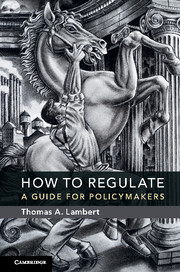The Law of Good People
Challenging States' Ability to Regulate Human Behavior
- Author: Yuval Feldman, Bar-Ilan University, Israel
- Date Published: May 2019
- availability: Available
- format: Paperback
- isbn: 9781316502082
Paperback
Other available formats:
Hardback, eBook
Looking for an inspection copy?
This title is not currently available on inspection
-
Currently, the dominant enforcement paradigm is based on the idea that states deal with 'bad people' - or those pursuing their own self-interests - with laws that exact a price for misbehavior through sanctions and punishment. At the same time, by contrast, behavioral ethics posits that 'good people' are guided by cognitive processes and biases that enable them to bend the laws within the confines of their conscience. In this illuminating book, Yuval Feldman analyzes these paradigms and provides a broad theoretical and empirical comparison of traditional and non-traditional enforcement mechanisms to advance our understanding of how states can better deal with misdeeds committed by normative citizens blinded by cognitive biases regarding their own ethicality. By bridging the gap between new findings of behavioral ethics and traditional methods used to modify behavior, Feldman proposes a 'law of good people' that should be read by scholars and policymakers around the world.
Read more- Challenges the current dominant endorsement paradigm
- Includes examples from a large variety of legal doctrines
- Provides a theoretical and empirical comparison of traditional and non-traditional enforcement mechanisms
Reviews & endorsements
'A fascinating, comprehensive exploration of the complexities of human motivations – and of how to get good people to do really good things. Opens up new vistas in behavioral science, and also in public policy. Highly recommended.' Cass R. Sunstein, Harvard University, Massachusetts
See more reviews'More than 40 years ago, economics revolutionized legal theory by analyzing the incentive effects of laws on people who are rationally self-interested. In recent years, cognitive psychology revolutionized law and economics by showing how legal incentives affect real people who are psychological, not purely rational. In The Law of Good People, Yuval Feldman provides a fresh perspective on laws aimed at motivating good people, as opposed to just deterring bad people. His creativity and knowledge of law, economics, and psychology will make readers rethink the incentive effects of laws and current theories of law and economics.' Robert Cooter, University of California, Berkeley School of Law
'In the mid-twentieth century, Hannah Arendt was criticized for speaking about the banality of evil in describing Adolf Eichmann, and even today Stanley Milgram's experiments showing the ease of ordering people to harm others is difficult to comprehend. Since then, psychological evidence has accumulated, revealing the undeniable daily harms that emerge from the unintended actions of 'good' people. In this excellent book, Yuval Feldman brings all the best research to those interested in imagining the good society. He admirably polishes the grimy results of behavioral science experiments until they shine with solutions for political and legal reform. It is rare to see a scholar write with the broad sweep Feldman does, and even rarer to have one so effectively persuade that central concepts in the law - property, conflict of interest, discrimination - cannot remain in their present form if only we would confront the evidence already before us.' Mahzarin R. Banaji, Harvard University, Massachusetts
'Should the law target the infamous Mr Hyde? No, says Yuval Feldman, who demonstrates why most individuals are not hard-nosed Mr Hydes. In fact, the law should be much more concerned with Dr Jekyll, who could turn into Mr Hyde at all times, but who will nevertheless convince himself that he remains the good-natured Dr Jekyll. In short, motivational plasticity, as Feldman explains, is a much bigger normative problem than merely being a 'bad person' in the first place. This book not only alerts legal academia to this idea, but also carefully discusses the implications for legal analysis and design.' Christoph Engel, Max Planck Institute for Research on Collective Goods
'This book is the first to introduce the large and heterogeneous body of work on behavioral ethics to the world of law and legal policy. Drawing in part on the author's own pioneering experimental work, the book moves beyond the reigning enforcement-based approach with its focus on cognition and deliberation, and takes greater account of complex motivations, especially of people with a self-conception as being a good person. Feldman provides an important first installment on evaluating law and related interventions in the light of this promising new paradigm.' Henry Smith, Harvard Law School, Massachusetts
'Weaving in disparate threads of economics and psychology, Professor Feldman delivers an exciting new approach to our understanding of ethical behavior. The implications of this work will influence our understanding of how to regulate good and evil for many years to come.' Jeffrey Rachlinski, Cornell Law School, New York
'By bridging the gap between new findings of behavioral ethics and traditional methods used to modify behavior, Professor Feldman proposes a 'law of good people' that should be read by scholars and policymakers around the world. A work of simply brilliant scholarship, The Law of Good People is a fully engaging, thought-provoking, informed and informative study that is unreservedly recommended for community and academic library Political Science, Judicial, and Contemporary Sociology collections and supplemental studies lists.' Library Bookwatch
'In The Law of Good People: Challenging States' Ability to Regulate Human Behavior, Feldman's goal is to 'create a new branch of scholarship that focuses on the rule of law in a world populated by individuals with different levels of awareness of their own unethicality'. … The Law of Good People is a foundational work and as such it is a springboard rather than an ending. Feldman points to a host of thought-provoking questions in need of further research and deliberations, such as, 'How blind is a blind spot from a legal perspective of responsibility?' and 'Can we know ex ante in what mode of reasoning people will be when making a decision about the law?'. Many young scholars, and quite a few older ones, will find this book highly stimulating, inviting new thinking, and new lines of research as well as legal policy.' Amitay Ezioni, Institute for Communitarian Policy Studies
'Feldman is rightly worried about the methodological limitations of behavioural ethics, and he is also right that there is nowhere near enough work to be confident about the underlying mechanisms behind these problems and the solutions to them. Many studies are small and experimental. Quirkiness is fun, but magic circle firms are not about to start building difficult-decisions suites stuffed with cuddly toys. Yet in these limitations is the central challenge: can ecologically realistic, methodologically robust, replicated studies develop our understanding of behavioural ethics further? Feldman and his collaborator's own studies are a rich resource here. Can regulators, or even lawyers and compliance managers, be encouraged to experiment with behavioural interventions? After all, lawyers need to be interested in both how rules work and how people behave ethically if they are to do their job effectively. Feldman's book shows us how important this could be.' Richard Moorhead, The Journal of Things We Like (Lots)
'… Yuval Feldman [has] convincingly developed an illustrative access to the topic of regulation which can [be] characterized as pioneering since it breaks up [ingrained] concepts but offers new insights based on behavioral aspects in an intelligible manner. Thus, the book 'The Law of Good People' offers a solid foundation to [recalibrate] the concepts of regulation which makes it indispensable for any well-selected library.' Armin Kammel, translated from Österreichisches BankArchiv
'The Law of Good People provides a comprehensive summary of an important body of research on Behavioral Ethics … will serve as a useful resource for legal scholars, lawyers, policymakers, and social scientists interested in law and legal institutions.' Janice Nadler, Michigan Law Review
Customer reviews
Not yet reviewed
Be the first to review
Review was not posted due to profanity
×Product details
- Date Published: May 2019
- format: Paperback
- isbn: 9781316502082
- length: 256 pages
- dimensions: 230 x 152 x 13 mm
- weight: 0.45kg
- contains: 7 b/w illus. 1 table
- availability: Available
Table of Contents
1. Introduction
2. Behavioral ethics and the meaning of good people for legal enforcement
3. Revisiting traditional enforcement interventions
4. Revisiting non-formal enforcement interventions
5. The role of social norms in legal compliance and enforcement
6. Are all people equally good?
7. Pluralistic account of the law: the multiple effects of law on behavior
8. Enforcement dilemmas and behavioral trade-offs
9. The corruption of 'good people'
10. Discrimination by 'good' employers
11. Summary and conclusion.
Sorry, this resource is locked
Please register or sign in to request access. If you are having problems accessing these resources please email [email protected]
Register Sign in» Proceed
You are now leaving the Cambridge University Press website. Your eBook purchase and download will be completed by our partner www.ebooks.com. Please see the permission section of the www.ebooks.com catalogue page for details of the print & copy limits on our eBooks.
Continue ×Are you sure you want to delete your account?
This cannot be undone.
Thank you for your feedback which will help us improve our service.
If you requested a response, we will make sure to get back to you shortly.
×








